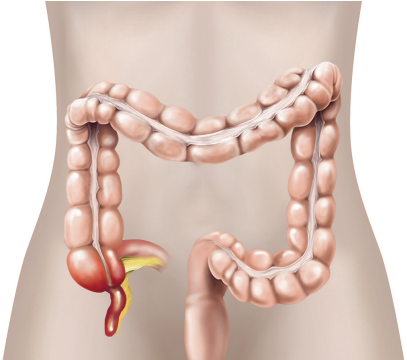What is appendicitis?
Appendicitis means inflammation of your appendix (see figure 1). When your appendix is inflamed it causes pain and makes you feel unwell.
What are the benefits of surgery?
Surgery removes the inflamed appendix and allows infected pus to be washed out. The aim is to prevent the serious complications that appendicitis can cause.
Are there any alternatives to surgery?
Antibiotics can be used to treat inflammation or an abscess, but only if you are well enough. If an abscess continues or if you become unwell even with antibiotics, you will need an operation.
What does the operation involve?
The operation is performed under a general anaesthetic and usually takes one to two hours. Your surgeon will remove your appendix either by using laparoscopic (keyhole) surgery or by an open cut on your abdomen.
What complications can happen?
1. General complications
- Pain
- Bleeding
- Unsightly scarring
- Blood clots
- Infection of the surgical site (wound)
2. Specific complications
- Incorrect diagnosis
- Developing an abscess
- Difficulty passing urine
- Continued bowel paralysis
- Developing a leak
- Obstruction of your bowel
- Pylephlebitis
How soon will I recover?
You should be able to go home three to five days after an operation for simple appendicitis or about a week after an operation for a burst appendix.
You should be able to return to work after about two to four weeks, depending on the extent of surgery and your type of work.
Summary
Appendicitis is a common condition where your appendix becomes inflamed. Surgery should prevent the serious complications that appendicitis can cause.
Acknowledgements
Author: Mr Ayan Banerjea FRCS (Gen. Surg.) and Prof Simon Parsons DM FRCS (Gen. Surg.) Illustrations: Medical Illustration Copyright © Medical-Artist.com
This document is intended for information purposes only and should not replace advice that your relevant health professional would give you.
